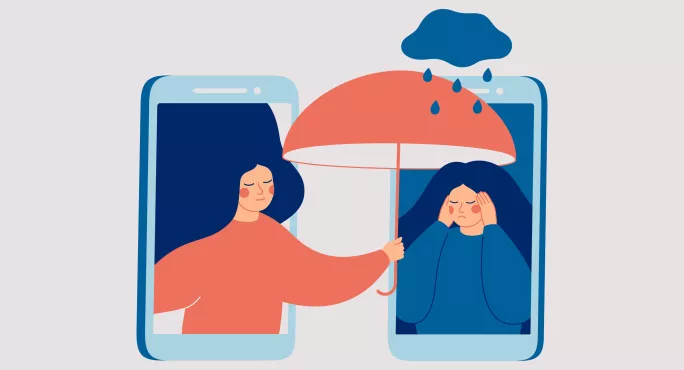Covid mental health: How writing stories helps students

As the months of lockdown rolled on, big questions around remote learning began to emerge in educator’s minds - the biggest of which was, of course, the impact it would have on our young people. It quickly became obvious that young people were craving connection: the social - and casual - interaction that comes from being in a classroom and around college.
Young people needed communication as well as an opportunity to express themselves about what was happening to them during extraordinary times - but, too often, opportunities were minimised, swallowed up in the urgency of online learning. Young people told us that their lives were dominated by:
- An overriding sense of isolation, disenfranchisement, disengagement.
- Fear of the future.
- Lack of trust and respect towards those in positions of power and politicians more specifically.
- A sense that their experiences were trivialised or ignored and that there was a lack of investment in them.
This pandemic has forced all of us to do things differently and we have had to challenge ourselves. For me, it’s clear that literature can provide a creative place that brings people together: writing is one way in which young people can be given opportunities to be listened to and taken note of. And so, in December last year, I set about building a student community of readers, critics and writers.
More by Elizabeth Draper: Let’s recognise speaking and listening in GCSE English
FE hero: ‘Without the funding, FE cannot survive’
News: Vaccine passports for FE students ‘premature’, says AoC
A creative forum to foster connection
You see, you cannot compensate for the loss incurred by this pandemic on our young people, and literature itself shows how connectivity comes from sharing stories. It became clear that a way needed to be found to invite young people to share their stories and narratives through a creative forum: a platform was needed for them as readers and authors.
I’m a trustee of the English Association and I harnessed our reach to set up a Literature and Action Project, which saw 16- to 18-year-olds participate from colleges across England. Teachers were crucial, here, in being the middle-people who connected us with young people and supported them in coming along to the first few meet-ups, in their own time.
The hunger to have this space in the middle of lockdown was absolutely palpable. Young people were eager to meet new people, experience new things and share together. In the first session, we went around the Zoom room, and everyone contributed personal responses to lockdown.
It was unforgettable. One young person said: “I go out at night, when it feels safer, you know, with Covid and everything. I walk around empty city streets lit up and look up at the stars.”
We hosted a “discovery workshop” which helped to kickstart everything. Two guests, John Beattie of Seven Stories, Newcastle, and Tiago Sousa Garcia, of Newcastle University, shared their thinking and practice around storytelling and creative digital possibilities. From there, shared writing and thinking spaces were created, work was read out to each other and the online space started to fill up with stories, articles, diary entries, films, drawings and poems.
It was heart-stopping stuff. This community of young writers grew in confidence and in connection - meeting together independently, supporting each other and sharing their work. We invited the contributors to take on the role of editing the publication and, as a result, we now have a publication written, illustrated and edited by young people.
They rose to the challenge and then some: we saw for ourselves, yet again, that if you offer up ambition, it is completely taken on and realised by young people.
At the launch, contributors spoke of the self-confidence they have gained in “stepping outside” of their colleges and joining a group of people from different colleges to share pandemic experiences and their own written responses. They agreed that this project gave them a reason to process and formulate their responses to Covid-19.
Our young people learned new skills in the writing and editing process as part of a writing community - sharing collective responsibility, keeping writing tabs on each other through the months. They enjoyed the giving and receiving of support and loved having a hard-copy volume to share with their family and friends, forever.
They said that they will not be surprised if, once the pandemic is over, people may forget what this time was like - but they now have these writings as testament to what it was like for them. One spoke of how, when she read her piece out to her family, her father cried; she had never seen such an emotional response as this from him before.
As one participant said: “Working with the English Association and other teens across the UK to make this publication has been inspiring, in every sense of the word. Witnessing the accumulation of so many experiences from so many different people, in so many different forms, has not only been personally helpful in my own creative journey but will hopefully let history know the effect the pandemic has had mentally, especially on the world’s youth.”
Elizabeth Draper is an English specialist, working in further education, advocating for a meaningful, relevant, enjoyable curriculum. She is a member of the OCR English Curriculum Consortium and trustee of the English Association, and she tweets @draperel. The Quaranteens was launched by The English Association on 18 July
You need a Tes subscription to read this article
Subscribe now to read this article and get other subscriber-only content:
- Unlimited access to all Tes magazine content
- Exclusive subscriber-only stories
- Award-winning email newsletters
Already a subscriber? Log in
You need a subscription to read this article
Subscribe now to read this article and get other subscriber-only content, including:
- Unlimited access to all Tes magazine content
- Exclusive subscriber-only stories
- Award-winning email newsletters